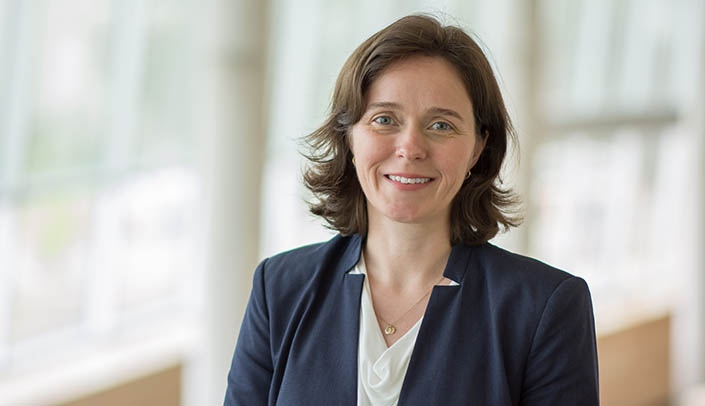Rachel Thompson, M.D., associate professor in the UNMC Department of Internal Medicine, is one of 10 physicians to receive a Top Hospitalist Award for 2017 from the hospitalist editorial board of the American College of Physicians (ACP).
She was nominated by colleagues and selected for her accomplishments in hospitalist practice such as patient care, quality improvement and medical education.
Being the first chief of hospital medicine at UNMC might seem daunting, but Dr. Thompson drew upon her academic experience to methodologically grow a new team.
When the medical director for clinical care transitions at Nebraska Medicine came to UNMC in 2015, multiple clinical groups came under one umbrella. The new hospital medicine group initially had 23 physicians and seven advanced practice providers, but Dr. Thompson oversaw rapid growth in the past year and a half. The section now has 44 physicians and 17 advanced practice providers.
Joining a new institution meant that it was first necessary to learn about the individual team members, she said. Retreats have been held with the goal of pulling the team together into one cohesive unit.
“We talked about what we were good at, rallied around setting team goals and starting the creation of a team vision, and solidified what our core values were as a team,” which are engagement, accountability, compassion and enjoyment, Dr. Thompson said.
So far, the group has designated four committees, which are responsible for outcomes, curricula, wellness and scheduling, and documentation.
The committees’ work already has begun. For example, Dr. Thompson said the outcomes committee tackled a transfer triaging issue, “which got the attention of the hospital to the point that we have actually now built a triage service, which is going to grow in the next year and a half for the hospital.”
Most recently, she combined her research interests and passion for education by developing and overseeing two research-training programs: the Hospital Medicine Summer Research Student program, which trains students in basic clinical research, and the Hospital Medicine Scholars program, a track for new faculty members who want to develop careers in clinical research.
Dr. Thompson said clinician engagement is a core component of innovation and improving patient care.
“People want to do this work and want to make things better, so one of the wonderful things about our team is that everybody’s in there doing something, helping to make things grow and move forward,” she said.
